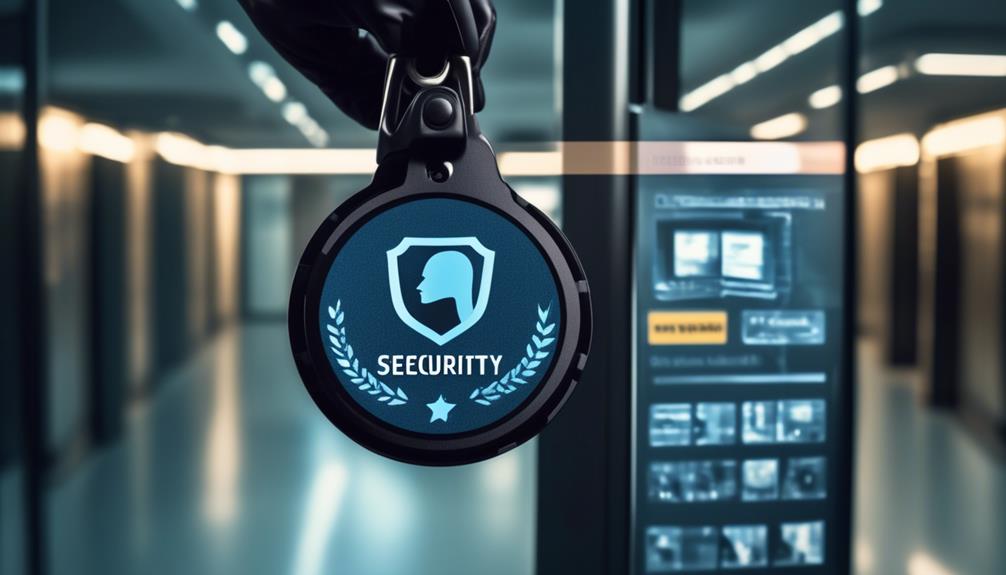‘Trust, but verify,’ goes the saying, and in the world of security professionals, this rings especially true.
BS7858 vetting stands as a crucial cornerstone in ensuring the integrity and reliability of those entrusted with safeguarding assets and maintaining security protocols.
By taking a closer look at why BS7858 vetting is indispensable for security professionals, you’ll uncover the layers of protection and peace of mind it offers to both employers and clients.
Importance of BS7858 Vetting
Ensuring the safety and trustworthiness of employees, BS7858 vetting is a crucial process that provides an extra layer of protection for handling assets and maintaining compliance with industry regulations. By verifying identification, address, right to work, credit history, employment background, and SIA license status, this screening method goes beyond standard checks.
Its significance extends to all industries, not just security, as it deters fraudulent activities, reduces theft risks, and fosters a secure work environment. Embracing BS7858 vetting elevates an organization’s reputation, instills credibility, and minimizes security incidents, thereby gaining a competitive advantage in the market.
The thoroughness of this vetting process underscores its importance in safeguarding assets and upholding regulatory requirements. Implementing BS7858 vetting practices shows a commitment to due diligence, ensuring that only reliable and trustworthy individuals are entrusted with critical responsibilities within the organization.
BS7858 Vs. Other Vetting Standards
The comprehensive nature of BS7858 vetting sets it apart from other vetting standards in the industry, particularly in its recent updates and additional checks. While there are various vetting standards in the security sector, BS7858 stands out due to its thoroughness and continuous adaptation to industry needs. A comparison table below illustrates the key differences between BS7858 and other common vetting standards, emphasizing the robustness and breadth of BS7858 in ensuring the integrity and safety of security professionals.
| Aspect | BS7858 | Other Standards |
|---|---|---|
| Social Media Checks | Included | Not consistently included |
| Global Watchlist | New checks introduced | Limited global screening |
| Right to Work | Aligned with current regulations | Varies depending on standard |
| Retention of Files | Specific guidelines for file retention | Varies widely among standards |
Key Role in Security Industry
Playing a crucial role in the security industry, BS7858 sets the standard for background checks in ensuring trustworthy and safe employees. Here’s why BS7858 is essential:
- Peace of Mind: Employers can trust that employees who’ve undergone BS7858 vetting meet stringent criteria, providing peace of mind in knowing they’ve reliable staff.
- Best Practice: Considered best practice in the security sector, BS7858 instills confidence in both employers and clients regarding the integrity of the workforce.
- Cross-Sector Applicability: With relevance across various industries such as finance, healthcare, and IT, BS7858 ensures a consistent level of security and compliance in handling sensitive information and assets.
- Complex Process: The thorough vetting process, including extensive checks on identity, work eligibility, credit history, and professional background, highlights the depth of analysis required to maintain security standards. BS7858 plays a vital role in safeguarding against potential threats, fraud, and misconduct within organizations.
Compliance and Legal Obligations
To uphold legal obligations and ensure compliance in the security industry, security professionals must prioritize adherence to BS7858 vetting standards. Compliance with industry regulations is crucial to maintaining the integrity and trustworthiness of security professionals. BS7858 vetting serves as a benchmark for meeting legal requirements, guiding the thorough background checks necessary for security roles. By following these standards, security professionals demonstrate their dedication to upholding legal and regulatory frameworks, reducing the potential for legal and reputational risks.
The framework provided by BS7858 vetting not only ensures compliance but also helps security professionals navigate the complex landscape of legal obligations within the industry. Adhering to these standards isn’t merely a recommendation but a necessary step in safeguarding both the individuals and the organizations they serve. By prioritizing compliance with BS7858 vetting, security professionals can proactively mitigate risks and uphold the high standards expected in the security industry.
Enhancing Security Personnel Quality
Elevate the standard of security personnel quality through rigorous implementation of BS7858 vetting procedures. By adhering to these vetting standards, you ensure a higher level of competence and reliability among your security staff.
Here’s how BS7858 vetting can enhance security personnel quality:
- Building Trust: Through thorough background checks and verification processes, BS7858 vetting instills trust in your security team, assuring clients and stakeholders of their credibility and integrity.
- Reducing Risks: By screening for criminal records, credit checks, and employment history, BS7858 helps mitigate risks associated with dishonest or unreliable individuals, promoting a safer work environment.
- Industry Compliance: Aligning with industry trends and regulations, BS7858 vetting ensures that security personnel meet the required standards, enhancing overall compliance and professionalism within the sector.
- Enhanced Performance: With BS7858 vetted personnel, you can expect a higher level of performance, as individuals are screened for suitability and competence, ultimately contributing to better security outcomes.
Ensuring Trust and Safety
Enhancing security personnel quality through rigorous implementation of BS7858 vetting procedures naturally ensures trust and safety in your workforce. By adhering to the standards set by BS7858, you guarantee that your employees have undergone thorough background checks, providing peace of mind to both you as an employer and to your clients. This vetting process, encompassing proof of identification, address verification, right to work checks, credit history assessments, employment background verification, and SIA license validation, establishes a solid foundation of trust within your team.
BS7858 isn’t limited to the security sector; it’s widely utilized across different industries like finance, healthcare, and IT, offering an additional layer of protection when handling sensitive assets. Tailoring the screening process to specific roles, such as conducting comprehensive background checks for security personnel and credit assessments for employees dealing with financial transactions, further bolsters the overall safety and reliability of your workforce.
Embracing BS7858 vetting practices ensures that your team is composed of trustworthy professionals committed to upholding the highest standards of integrity and security.
Conclusion
In conclusion, BS7858 vetting is crucial for security professionals to demonstrate their trustworthiness and reliability in the industry.
By adhering to this standard, security personnel can ensure compliance with regulations, enhance security measures, and provide peace of mind to employers.
It plays a key role in maintaining the quality of security personnel, meeting legal obligations, and ultimately ensuring the trust and safety of all stakeholders involved.



